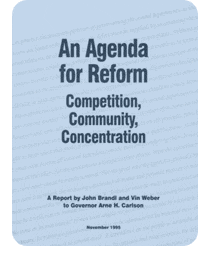1990s and Beyond: Equal Rights for All
Americans with Disabilities Act (ADA) Signed
In 1990, the historic Americans with Disabilities Act (ADA) was signed by President George Bush. The ADA incorporated the statements made about equal rights from all previous decades. The Act was co-sponsored by Senator Dave Durenberger and Senator Tom Harkin of Iowa.
For the first time, citizens with broad-based disabilities, developmental and otherwise, had national legislation that protected their rights as individuals. It also forced employers, educators, landlords, builders and other service providers to improve access and opportunities to all citizens regardless of their abilities.

President George Bush signed the historic Americans with Disabilities Act in 1990.
Governor Arne Carlson Reviews Medicaid Budgets
Upon election in 1990, Governor Arne Carlson asked Kent Eklund, as an outside expert on social services, to informally analyze Medicaid budgets and identify areas for reform.
As a result of Eklund's recommendations, the Governor's Chief of Staff convened several agencies to discuss reform opportunities. On November 23, 1992, representatives of Human Services, Administration, Health, Housing Finance, Employee Relations, Finance and the Ombudsman Office met to study privatization. They also began developing a plan to remove the state from the institutional care system.
Bruce Johnson, the Task Force's point person, soon became known as the "closure czar."

Governor Arne Carlson
Video: Bruce Johnson headed an interagency task force on state hospital closings.
Part 1: A Catalyst of Deinstitutionalization

The state hospital at Faribault was transferred to the Department of Corrections on September 1, 1994.
The interagency team met for three years, dealing with a logjam of issues involving employment numbers, state-operated services, prison beds, mental health dollars for counties and bonding money.
During that time, the institutional system would shrink dramatically.
Among the resulting changes: The Moose Lake facility closed May 4, 1994. The Faribault hospital officially transferred to the Department of Corrections on September 1, 1994.
Public Hearings Called "Speak Out" Conducted
In January 1992, Jerry Lovrien was appointed to chair a group studying community services reform. Miriam Karlins again conducted public hearings, called "Speak Out," that were attended by nearly a thousand people.
The resulting recommendations called for greater individualization, better funding, more training and improved quality assurance.

Nearly 1,000 Minnesotans attended public hearings on reforming community services for people with developmental disabilities.
Video: John Johnson, institutionalized from the age of 5 to age 60, now lives independently and works at an area restaurant.
Part 1: Life at Faribault and Owatonna Institutions
Part 2: One of the First Former Residents Who Lived and Worked Independently

The federal "A Home of Your Own" program helped people with developmental disabilities become home owners.
In 1991, New Hampshire became the first state to no longer operate an institution.
A Lou Harris poll reported that public attitudes about disabilities had improved and the federal government began an initiative called "A Home of Your Own" to assist people with developmental disabilities to become home owners.

Thanks to "Remembering with Dignity," the graves of state hospital residents receive appropriate commemorations.
Advocating Change Together (ACT), a non-profit organization whose members are individuals with developmental disabilities, called for a public apology to those who had lived – and died – in the state's regional treatment centers. ACT began an effort to mark the graves of former residents buried anonymously in regional treatment center cemeteries.
The campaign, called "Remembering with Dignity," continues today.
"Agenda for Reform"

The "Agenda for Reform" recommended that funds be appropriated directly to the citizens.
Facing a bleak fiscal forecast in 1995, Governor Carlson asked John Brandl, University of Minnesota professor at the Humphrey School of Public Affairs, and Vin Weber, an independent consultant and former member of Congress, to identify ways to restructure services and avoid an $8 billion budget crisis.
In response, Brandl and Weber developed the "Agenda for Reform," urging that all services for people with developmental disabilities be "means tested" (or tested for income), and that funds should go directly to citizens, not bureaucracies.
The "Olmstead Descision"

Stephen Gold
In 1993, Stephen Gold represented Helen L. in a Pennsylvania case, "Helen L. v. Desario." The Pennsylvania case challenged the state's referral system which previously focused on providing attendant care services in a nursing home environment rather than the preferred method of providing services directly in the community.
L. C. and E. W. from Georgia later filed a similar suit and Sue Jameson represented them. Referred to as the "Olmstead Decision," the landmark case was settled by the U.S. Supreme Court on June 22, 1999. The decision calls for states to provide services in the most integrated setting.








